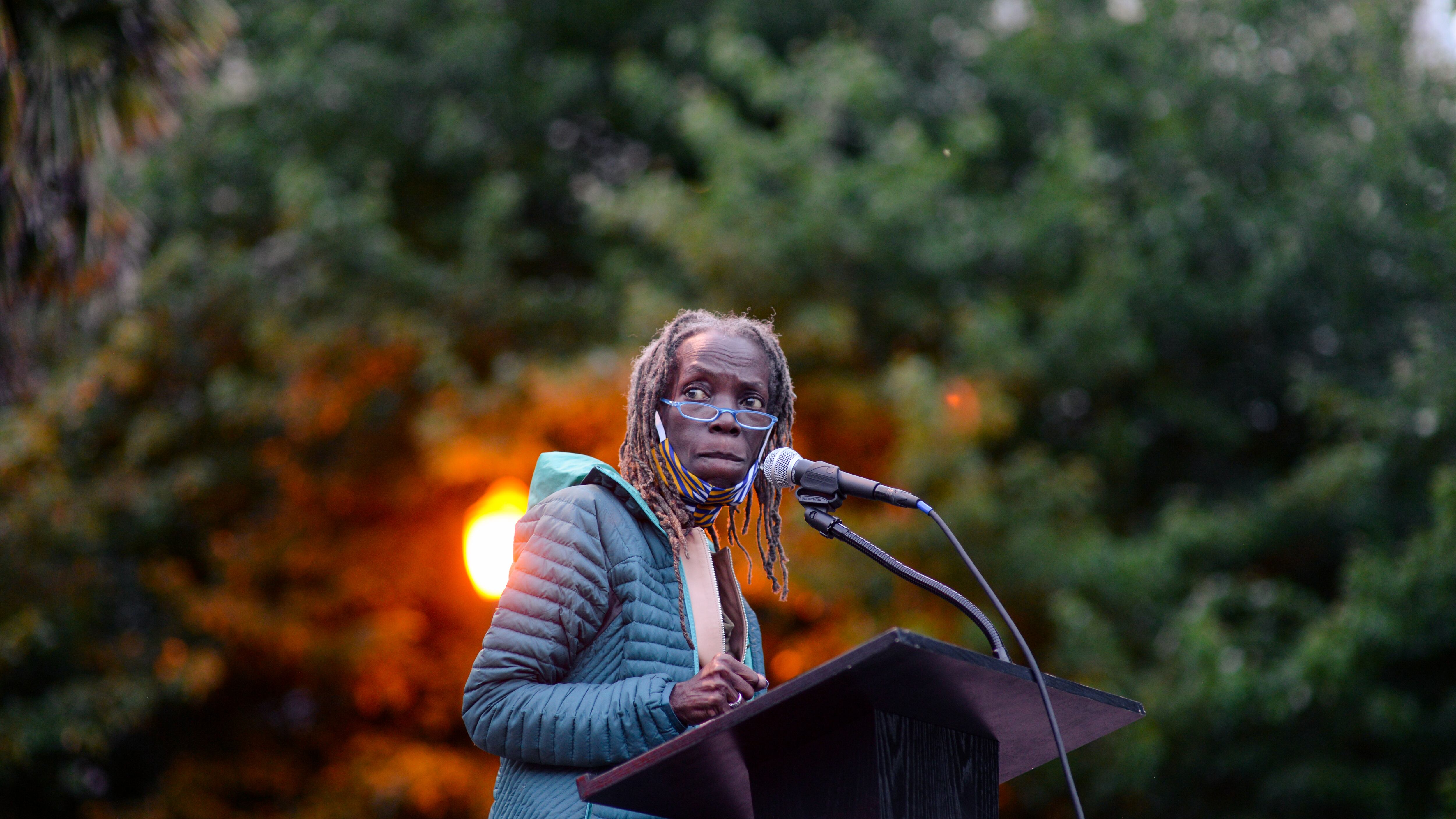A forum Thursday night at the Laurelhurst Club in Southeast Portland highlighted—perhaps more starkly than in other settings—the policy divisions between Commissioner Jo Ann Hardesty and her two challengers, Vadim Mozyrsky and Rene Gonzalez.
The Laurelhurst Neighborhood Association hosted the event. That neighborhood association has been particularly vocal about its opposition to clusters of tents and people camping in cars adjacent to the lush park. Last year, for the second time, the city swept the camp along Southeast Oak Street after reports of camp residents bearing weapons. (WW wrote a number of articles about the increasing tension between the campers and nearby residents.) Since then, many of those tents and cars have returned.
On Wednesday, Gonzalez and Mozyrsky leaned into the neighborhood’s concerns, using the forum as a space to further highlight the divide between them and the incumbent, who’s been the most vocal city commissioner about opposing sweeps and reforming the Portland Police Bureau.
Both challengers apologized to the neighborhood for the presence of tents and trash near the park; Mozyrsky said at one point the City Council was “not listening to the people in this room,” calling it “divisive and not inclusive.” (Earlier this week, WW profiled Mozyrsky, who said the Portlanders listened to least by City Hall were neighborhood associations.)
During the forum, the moderator would ask a question and allow each candidate two or three minutes to respond. Despite the format not allowing candidates to speak over one another, both Gonzalez and Mozyrsky took digs at Hardesty over the course of the first hour. The sourness between Mozyrsky and Hardesty was especially acute.
The moderator asked why parking tickets were unequally enforced across the city—referring to fact that people sleeping in their cars were not ticketed as often as housed people who exceeded their parking limit or parked in a prohibited space.
Parking laws should be enforced for everyone equally, Mozyrsky said, calling it a “precept of America: You treat everyone equally but enforce the laws. Let’s bring back common decency. Right now, we have a lawless society in Portland.”
All three candidates touted the importance of opening sanctioned camping and parking spaces across the city to accommodate those living on the streets. Mozyrsky and Gonzalez added they wanted to see emergency shelters erected, too—a controversial model for addressing houselessness.
Another question asked what the city should do if the houseless are “service resistant,” meaning they are offered a shelter bed or other lodging and decline that service.
Gonzalez said that when there is sufficient shelter, the law should be enforced against those who are service resistant.
“When there is sufficient shelter and they’re resistant, they have to face the judicial system,” Gonzalez said. “We have to demand personal responsibility as well. Or else we continue to enable really destructive and societally destructive behaviors.”
Hardesty fought back on that point, calling the term “service resistant” an “oxymoron”: “I’ve never met anyone who wants to live on the street.”
Gonzalez said that if houseless people defecated in public or participated in violent crime, they should be arrested: “That’s not criminalizing the unsheltered,” he said. “That’s addressing those externalities [of hard drug use]”. (He also said the state needed to reevaluate the passage of Measure 110 that decriminalized many hard drugs, which he said “made a bad situation worse.”)
While Mozyrsky took a more moderate stance, he, too, talked about houselessness and crime being intertwined. At one point, as a parallel to the Laurelhurst neighborhood, Mozyrsky spoke about a recent visit to the Lents neighborhood. Mozyrsky said there were “people breaking into their cars and houses, open fires and syringes” and attributed those infractions to the nearby houseless community. He also claimed that petty crimes served as an onramp to more serious crimes.
On policing, Gonzalez and Mozyrsky both positioned themselves as law-and-order candidates, calling for an increased police force.
Both challengers scolded the city for cutting the police budget in 2020. Mozyrsky said that when he testified against a second round of police budget cuts in late 2020, a proposal pushed by Hardesty, that “people were scared to speak up” to oppose it, adding that their fear was centered on the then-ongoing “protests and riots and what that would mean for their businesses.” At this, Hardesty shook her head.
Hardesty said she did not have an ideal number of police officers in mind because she was awaiting a recommendation by the U.S. Department of Justice. Mozyrsky said sarcastically: “I don’t know why the DOJ has to tell the city of Portland what to do,” which got some chuckles from the crowd.
This audience and the neighborhood are perhaps the toughest Hardesty could face. They’ve been disenchanted by the cars and tents in their streets, and have put consistent pressure on the city to remove those camps.
In a particularly uncomfortable moment in response to a question about charter reform, Mozyrsky said that he, as part of the Charter Review Committee, spoke with each commissioner’s office to ask how the current government was working. He said that all but one commissioner said it wasn’t working well; the one who disagreed was Hardesty, he said. “She said no, because she got elected and she could dole out contracts to people.”
At this, Hardesty shook her head. Hardesty, when she spoke after Mozyrsky, expressed frustration at his suggestion that she opposed altering the form of government. She said her job was to ensure funding for the 20-member committee and then “shut up and let them do their work.”
“Whatever makes it to the ballot, I will support because I trust those 20 committee members,” Hardesty said. “I’m not weighing in on any changes until we get that information back.”
